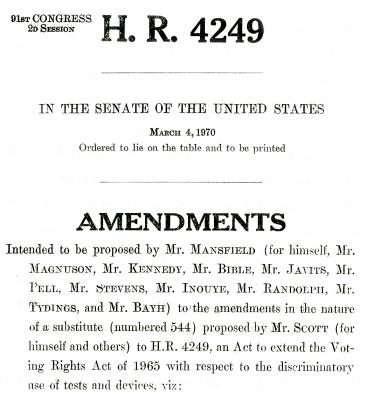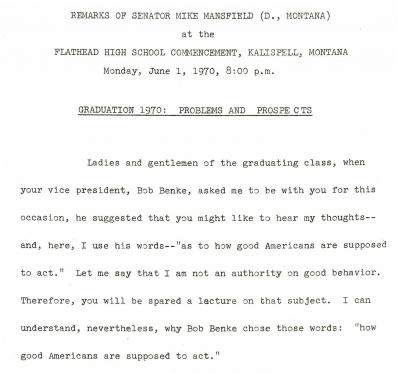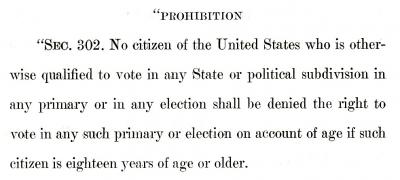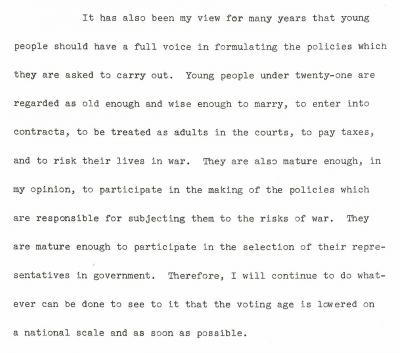‘Old Enough to Fight, Old Enough to Vote’:
Mike Mansfield and the Eighteen Year Old Vote
By Nolan Franti, August 2012
On June 1, 1970, Democratic Senator and Majority Leader Mike Mansfield gave a commencement speech at Flathead High School in Kalispell, Montana.[1] The title of the address was “Problems and Prospects,” a fitting theme during a turbulent period in America. During the late 1960s and early 1970s increasing numbers of the nation’s youth were protesting against racial injustice, gender discrimination and the war in Vietnam.[2] Among the topics of Mansfield’s speech was the national campaign to lower the voting age to 18, a goal Mansfield had consistently promoted as Senate Majority Leader and one he was soon to play a prominent role in achieving.
The voting age in 1970 was 21 in all but four states, the exceptions being Kentucky and Georgia, where the voting age was 18, and Alaska and Hawaii, where the voting ages were 19 and 20, respectively.[3] Advocates of lowering the voting age, including Mansfield, argued that if Americans between 18 and 21 were old enough to serve their country in Vietnam, they were old enough to vote.[4] To counter suggestions that young people were not responsible enough to exercise the franchise, Mansfield argued in his Flathead High commencement speech: “Young people under twenty-one are regarded as old enough and wise enough to marry, to enter into contracts, to be treated as adults in the courts, to pay taxes, and to risk their lives in war…They are mature enough to participate in the selection of their representatives in government.” Mansfield pledged his support as Senate Majority Leader for the eighteen-year-old vote, stating “Therefore, I will continue to do whatever can be done to see to it that the voting age is lowered on a national scale and as soon as possible.”[5]

Mansfield sponsored a series of bills and constitutional amendments to lower the voting age to 18 in all federal, state, and local elections. In introducing Amendment No. 545 to the Voting Rights Act of 1965 on March 4, 1970,[6] Mansfield stated his belief that young people’s “probing intelligence, deep interest, and eagerness to participate in the elective process exemplify the best qualities of responsible citizenship.” He argued that “the idealism and enthusiasm they bring to the ballot box cannot but have a beneficial influence on the conduct of government.”[7] Amendment No. 545 passed the Senate and House with bipartisan support, and was signed into law by President Nixon on June 22, 1970, just three weeks after Mansfield’s Flathead High School commencement address.[8] With Nixon’s signature, the entire nation’s eighteen to twenty-year-olds were able to vote for the first time.
The battle for the youth vote was not over, however. There was some doubt as to whether Congress had the authority to set voter qualifications, or if that right was reserved to the states.[9] In the landmark decision Oregon v. Mitchell (December 1970), the Supreme Court found that Congress had the power to set voter qualifications in federal elections only, striking down the part of the law granting voting rights to eighteen-year-olds in state and local elections.[10] The only way to guarantee the entire nation’s youth the franchise would be a constitutional amendment.
Lawmakers had proposed constitutional amendments to lower the voting age as early as 1941, when Senator Harley Kilgor (D-W.V.) introduced a joint resolution advocating an eighteen-year-old voting age.[11] Similar resolutions, sponsored by proponents echoing the “old enough to fight, old enough to vote” mantra, found their way onto the Senate floor during World War II and the Korean War.[12] President Eisenhower had called for lowering the voting age to 18 in his 1954 State of the Union address, and Nixon, then Eisenhower’s Vice President, had echoed this sentiment in 1960 during his first presidential campaign. As for Mansfield, he had in 1967[13] and 1969[14] proposed constitutional amendments in the Senate to enfranchise eighteen-year-olds, but these resolutions had failed to pass either the Senate or the House.
On January 25, 1971, Senator Jennings Randolph of West Virginia introduced a constitutional amendment, Senate Joint Resolution No. 7, to lower the voting age to 18 in all elections. The resolution was co-sponsored by a number of Senators from both political parties, including Mike Mansfield.[15] When Senator Ted Kennedy of Massachusetts introduced an amendment to the resolution that would have granted congressional representation to the District of Columbia, advocates of the 18-year-old vote worried that Kennedy’s controversial proposal would dilute support for the resolution. Mansfield helped save Resolution No. 7 by making a motion to table the Kennedy Amendment. The motion to table carried, and Resolution No. 7 passed the Senate by a unanimous vote of 94-0 on March 10, 1970. The House passed an identical copy of the resolution by the necessary two-thirds majority on March 23.[16] Three-fourths of the nation’s state legislatures needed to ratify the constitutional amendment for it to be adopted. That threshold was reached on June 30, 1971, when Ohio became the 38th state to ratify the amendment. The text of Senator Randolph’s Joint Resolution, which Mansfield had supported for so many years in the Senate, officially became the Twenty-Sixth Amendment to the Constitution on July 5, 1971, at a certification ceremony at the White House.[17]
As Mansfield concluded his commencement speech at Flathead High in June 1970, he offered cautious words of optimism to his young audience. “Your generation is both realistic and idealistic,” he said. “Therein lies your great strength…I have every confidence that you will not let the nation down. I have every confidence that the nation will not let you down.”[18] A year later, the nation had ratified a constitutional amendment granting those young people the right to vote. Through their continuing influence on the nation’s politics, the nation’s youth have done their best to bring to reality Mansfield’s vision of a more inclusive, idealistic, and energetic electorate.
Questions about the essay can be sent to library.archives@umontana.edu.



